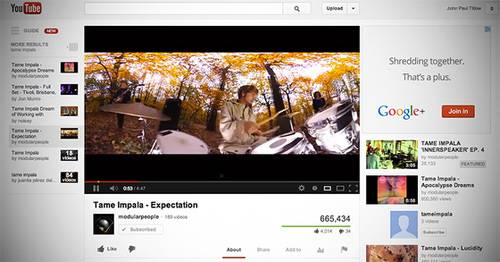
Google is reportedly working on a music subscription service to compete with the likes of Spotify, MOG and Rdio. It might seem crazy to jump into a crowded market whose basic business model is already questionable – but for Google it makes perfect sense.
The company is already a huge, albeit unofficial, player in streaming music. YouTube is now a top destination for listening to songs and albums, not to mention the trove of remixes and parodies that get uploaded everyday. Today, when teenagers want to hear a new song, they don’t turn on the radio or buy a CD. They go to YouTube.
There’s good reason for that. First off, it’s free. It also has an enormous amount of music. I’ve had premium subscriptions to Rdio, Rhapsody and (currently) Spotify. As extensive as those services’ libraries are, there’s lots of music they don’t have. Whenever I can’t find something on Spotify, I check YouTube and SoundCloud. It’s usually there. Want to stream the Beatles from your phone? Their songs are all over YouTube, not Spotify.
YouTube: The World’s Biggest Accidental Music Service
If there was any question about the critical role YouTube plays in music discovery, it was answered last week when Billboard announced it will factor YouTube listens into the formula behind its Hot 100 singles chart. In a post-“Call Me Maybe” world, it’s impossible to accurately analyze the popularity of a song without taking YouTube plays into consideration.
Of course, the music-streaming use case is not quite what YouTube was designed for. It’s a video site. It may work as a one-song-at-a-time music search engine to fill Spotify’s gaps, but it’s pretty poorly organized compared to existing music services. That’s why Google Music is a more logical and likely home for this rumored streaming service, presumably with some cross-promotion via YouTube.

The fact that people turn to YouTube for music is something that evolved organically thanks to its user-generated nature and Google’s willingness to pay licensing fees to keep the music playing. There’s still plenty of copyright infringement going on, but Google is getting more aggressive about dealing with that. The RIAA may still complain, but more and more, Google is catering to copyright owners. Initiatives like this are exactly why the Plex is so eager to please the content industry.
Thanks to YouTube and the Google Music MP3 store, the company already has relationships in place with labels, songwriters and other copyright owners. But those existing partnerships aren’t enough. The subscription-based streaming model is fundamentally different and requires unique, rather costly licensing deals.
Music Streaming Is About To Get Even More Crowded
If you think the music streaming space is crowded now, just wait. Deezer, a hugely popular streaming service now available in 182 countries, is in talks to launch in the U.S. sometime this year. This summer, another much-hyped streaming service will go live, this time from Beats Audio, which acquired MOG last year. Then there’s the ongoing rumor about Apple taking aim at Pandora with an iTunes-based Internet radio product of its own.
Exactly what Google’s streaming service will look like is anybody’s guess. That will depend in large part on what kind of content deals it can manage to negotiate. But the company is in a very good position to enter this space. After all, Google already has millions of streaming music users. It just needs to polish (and almost certainly rebrand) the experience and make it official with the major labels.
Lead photo by Alexandre Normand
















